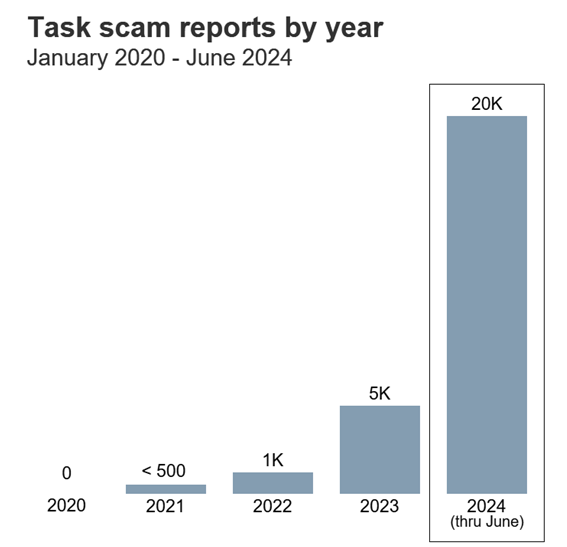Job Scams Cost Americans Hundreds of Millions of Dollars in 2024

Scammers are increasingly targeting netizens with fake job offers – chief among them ‘task scams’ that use gamification techniques to trick victims into depositing crypto in exchange for larger returns, the Federal Trade Commission warns.
Reported losses to job scams more than tripled from 2020 to 2023 and, in just the first half of 2024, topped $220 million, according to the latest data spotlight from the FTC.
Driving the trend are gamified job scams, often called task scams, reported by 20,000 people in the first half of the year (compared to just 5,000 in all of 2023). The agency notes that reports lacking a narrative describing the experience were excluded from the analysis, and since most frauds are not even reported, the true figures are likely much higher, and the damage far more serious than reported.
Tasks scams are skyrocketing
According to the data spotlight, task scams have soared in the last four years, from an inexistent threat in 2020 to 5,000 reports in 2023, then quadrupling to about 20,000 in just the first half of this year.

Source: FTC
Task scams often start with a text or WhatsApp message about online work involving a simple, repetitive activity for “product boosting” or “app optimization.” Victims are directed to an online platform where they receive small payouts from the supposed job, making the scam credible.
“Then the scam pivots, asking consumers to put their own money in to complete the next set of tasks, always with a promise it will lead to more money coming back, but once they send it, the money is lost for good,” according to the FTC.
The scam is designed to hook victims in more ways than one. For example, in some instances, if the victim hesitates to deposit money, scammers often invite them to a group chat where newcomers hear supposed success stories from (fake) experienced workers.
Job scams are increasingly lucrative
Task scams helped drive the overall increase in reported losses from all types of online job swindles. Overall reported losses tripled from 2020 to 2023 and topped $220 million in just the first six months of 2024. Task scams alone accounted for almost 40% of the 2024 job scam reports, the FTC notes.
Unsurprisingly, The only item you should ever be paying for upfront when getting a job is your bus ticket, or Uber ride to the interview.often instruct victims to make deposits in cryptocurrencies, which are notoriously hard to trace once the scammer cashes in and makes an exit.
Crypto payments have helped drive losses to job scams generally – about $41 million in the first half of 2024, compared to about $21 million in all of 2023, according to the agency. People now report losing far more money to job scams using cryptocurrency than any other method of payment, the report says.
How to spot and avoid job scams
Generally, any WhatsApp message not coming from one of your contacts should be considered suspicious – especially messages about jobs. As the FTC emphasizes, no real employer will ever contact you that way.
The concept of you paying first to get paid later is another big red flag. The only item you should ever be paying for upfront when getting a job is your bus ticket, or Uber ride to the interview.
As the FTC notes: “Never pay anyone to get paid. Someone telling you to pay money to get the money you’ve supposedly earned is a sure sign of a scam. No legit business would ever do that.”
Also, getting paid for likes or ratings is illegal, so consider this another red flag.
The FBI in June issued a public service announcement drawing attention to this exact type of sham, where fraudsters contact people randomly by text or phone offerring fake work-from-home jobs, typically involving a relatively simple task, such as rating restaurants or ‘optimizing’ a service by repeatedly clicking a button.
Scams have run rampant in recent years
According to the Bitdefender 2024 Consumer Cybersecurity Assessment Report, scams run rampant worldwide yet consumers still engage in complacent cybersecurity practices.
Bitdefender offers Scamio as a way to combat online scams, as well as those happening over the phone. If you’re suspicious about a certain phone call, email, or text message, simply describe the situation to our clever chatbot and let it guide you to safety. You can share with Scamio the exact thing you want to check, like a screenshot, link, QR code, etc. Scamio lets you know in seconds if it’s a sham.

